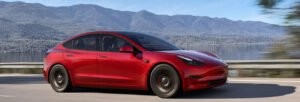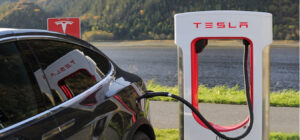Marketing mix of Tesla (7Ps of Tesla)
This article offers a detailed examination of the marketing mix of Tesla (7Ps of Tesla). Tesla Inc is an American electric vehicle and clean energy company. Its mission is to accelerate the world’s transition to sustainable energy. It is headquartered in Texas.
Tesla’s product strategy
Tesla’s product strategy is central to its success. It produces high-quality electric vehicles that are both stylish and sustainable. It also produces solar energy for both commercial and residential uses (Tesla, 2023).

Tesla’s product portfolio includes the Model S, Model 3, Model X, and Model Y. Each of these vehicles has unique features that cater to different customer preferences. In addition, its Roadster, Semi, and Cybertruck are likely to revolutionise the future of transportation.
Tesla’s vehicles stand out for their innovative features. The autopilot system, over-the-air updates, and high safety ratings are just a few examples of the innovation. Its commitment to innovation is a key differentiator in the market, setting it apart from other automobile manufacturers.
Beyond vehicles, Tesla is also making waves in the clean energy sector with its solar energy products and power storage solutions. These products align with the company’s mission of promoting sustainable energy and further differentiate the brand in the market.
However, it should be noted that many customers are unhappy with the issues they face with their cars and the technical support they receive from the company. This is clear from the reviews available on Trustpilot (Trustpilot, 2023).
Price strategy of Tesla
Pricing is a key element in the marketing mix of Tesla (7Ps of Tesla). Tesla’s pricing strategy reflects its market positioning as a premium brand. The prices of vehicles are relatively high. However, this high price is in line with Tesla’s value-based pricing strategy, where the price is determined by the perceived value of the product to the customer.
Redding (2023) reports that the main reasons for expensive costs of Tesla cars are due to the company’s decision to use best materials and sophisticated technology. In addition, many components are designed and developed in the USA which naturally drives up the price of the final products.
Despite the high prices, Tesla’s vehicles offer excellent value for money. The lower running costs, high resale value, and the environmental benefits of driving a Tesla car make it a worthwhile investment for many customers.
Place/distribution strategy of Tesla
Tesla sells directly to customers and avoid operating like a traditional car dealership. It has many stores, service centres, and charging points around the world. This strategy of direct interaction with customers allows Tesla to control the customer experience and maintain its brand image. Its vehicles are also sold online through its corporate website.
In terms of geographical distribution, Tesla has a strong presence in the US, its home market. However, it has also expanded globally, with significant market shares in China, Europe, and other regions. Its global distribution strategy enables it to tap into the growing demand for electric vehicles worldwide.
Promotion strategy of Tesla
Promotion is another key element in the marketing mix of Tesla (7Ps of Tesla). Tesla’s promotion strategy is as unique as its products. It relies heavily on word-of-mouth marketing and the buzz created by its CEO, Elon Musk.
It has been the decision of Elon Musk that there is no need for Tesla to advertise because the demand for the vehicles outstrips supply. Therefore, it leverages social media, PR events, and its loyal customer base to promote its products.
However, there have been some changes in Tesla’s promotional strategy. Isidore (2023) reports that the company has decided to do ‘a little advertising’ to see ‘how it goes’.
Tesla’s people strategy
Tesla’s employees, from its engineers to its sales staff, play a vital role in delivering the Tesla experience. The company invests heavily in training its employees to ensure that they have the knowledge and skills to promote its mission of sustainable energy.
Elon Musk, Tesla’s CEO, is a key factor in the brand’s success. His vision, leadership, and charisma have significantly shaped Tesla’s image and market presence. His active engagement with the public and his openness to feedback have helped build a strong rapport with the company’s customers and stakeholders.
Tesla goes above and beyond to ensure customer satisfaction, addressing concerns promptly and continually improving its products based on customer feedback. However, many customers are not happy with its technical supports (Trustpilot, 2023).
Process strategy of Tesla
Tesla’s process strategy is focused on efficiency, innovation, and customer satisfaction. The ordering process for its vehicles is straightforward and user-friendly. Customers can customise their vehicle and order online, making the purchase process convenient and hassle-free.
In terms of manufacturing, Tesla uses cutting-edge technology and automation to ensure the highest quality standards. It continually innovates its manufacturing processes to increase efficiency and reduce costs.
Physical evidence in Tesla
Physical evidence is the final element in the marketing mix of Tesla (7Ps of Tesla). In Tesla’s case, the physical evidence includes its stores, vehicles, charging stations, logo, colour etc.
Tesla’s stores and galleries are designed to be inviting and informative. They are more than just showrooms; they provide an immersive experience where customers can learn about electric vehicles and sustainable energy. Tesla’s vehicles themselves are strong physical evidence of the brand’s commitment to quality, innovation, and sustainability.
Tesla’s charging stations (Supercharger network) not only provide a necessary service for Tesla drivers but also reinforce the feasibility and convenience of electric vehicle ownership. However, more stations need to open to keep up with the demand. Likewise, more stations need to be accessible to non-Tesla EV drivers.

Conclusion: Marketing mix of Tesla (7Ps of Tesla)
To conclude, it can be argued that Tesla’s focus on innovation, sustainability, and customer satisfaction is reflected in every element of its marketing mix. As the company continues to innovate and push boundaries, its marketing mix will undoubtedly evolve. However, its core principles of quality, innovation, and sustainability are likely to remain at the heart of its marketing strategy.
Hope you like this article: Marketing mix of Tesla (7Ps of Tesla)? You may also like:
Advantages and disadvantages of electric cars
PESTEL analysis of the electric car industry
Last update: 01 September 2023
References:
Isidore, C. (2023) Tesla will advertise for the first time, available at: https://edition.cnn.com/2023/05/16/business/tesla-advertising/index.html (accessed 31 August 2023)
Redding, C. (2023) Why is Tesla so expensive, available at: https://www.carshtuff.com/post/why-is-tesla-so-expensive (accessed 01 September 2023)
Tesla (2023) About us, available at: https://www.tesla.com/en_gb/about (accessed 31 August 2023)
Trustpilot (2023) Tesla, available at: https://uk.trustpilot.com/review/www.teslamotors.com (accessed 31 August 2023)
Author: M Rahman
M Rahman writes extensively online and offline with an emphasis on business management, marketing, and tourism. He is a lecturer in Management and Marketing. He holds an MSc in Tourism & Hospitality from the University of Sunderland. Also, graduated from Leeds Metropolitan University with a BA in Business & Management Studies and completed a DTLLS (Diploma in Teaching in the Life-Long Learning Sector) from London South Bank University.



